- Home
- Nathaniel Hawthorne
Rappaccini's Daughter: By Nathaniel Hawthorne - Illustrated Page 2
Rappaccini's Daughter: By Nathaniel Hawthorne - Illustrated Read online
Page 2
Guasconti returned to his lodgings somewhat heated with the wine he had quaffed, and which caused his brain to swim with strange fantasies in reference to Dr. Rappaccini and the beautiful Beatrice. On his way, happening to pass by a florist's, he bought a fresh bouquet of flowers.
Ascending to his chamber, he seated himself near the window, but within the shadow thrown by the depth of the wall, so that he could look down into the garden with little risk of being discovered. All beneath his eye was a solitude. The strange plants were basking in the sunshine, and now and then nodding gently to one another, as if in acknowledgment of sympathy and kindred. In the midst, by the shattered fountain, grew the magnificent shrub, with its purple gems clustering all over it; they glowed in the air, and gleamed back again out of the depths of the pool, which thus seemed to overflow with colored radiance from the rich reflection that was steeped in it. At first, as we have said, the garden was a solitude. Soon, however,--as Giovanni had half hoped, half feared, would be the case,--a figure appeared beneath the antique sculptured portal, and came down between the rows of plants, inhaling their various perfumes as if she were one of those beings of old classic fable that lived upon sweet odors. On again beholding Beatrice, the young man was even startled to perceive how much her beauty exceeded his recollection of it; so brilliant, so vivid, was its character, that she glowed amid the sunlight, and, as Giovanni whispered to himself, positively illuminated the more shadowy intervals of the garden path. Her face being now more revealed than on the former occasion, he was struck by its expression of simplicity and sweetness,--qualities that had not entered into his idea of her character, and which made him ask anew what manner of mortal she might be. Nor did he fail again to observe, or imagine, an analogy between the beautiful girl and the gorgeous shrub that hung its gemlike flowers over the fountain,--a resemblance which Beatrice seemed to have indulged a fantastic humor in heightening, both by the arrangement of her dress and the selection of its hues.
Approaching the shrub, she threw open her arms, as with a passionate ardor, and drew its branches into an intimate embrace--so intimate that her features were hidden in its leafy bosom and her glistening ringlets all intermingled with the flowers.
``Give me thy breath, my sister,'' exclaimed Beatrice; ``for I am faint with common air. And give me this flower of thine, which I separate with gentlest fingers from the stem and place it close beside my heart.''
With these words the beautiful daughter of Rappaccini plucked one of the richest blossoms of the shrub, and was about to fasten it in her bosom. But now, unless Giovanni's draughts of wine had bewildered his senses, a singular incident occurred. A small orange-colored reptile, of the lizard or chameleon species, chanced to be creeping along the path, just at the feet of Beatrice. It appeared to Giovanni,--but, at the distance from which he gazed, he could scarcely have seen anything so minute,--it appeared to him, however, that a drop or two of moisture from the broken stem of the flower descended upon the lizard's head. For an instant the reptile contorted itself violently, and then lay motionless in the sunshine. Beatrice observed this remarkable phenomenon and crossed herself, sadly, but without surprise; nor did she therefore hesitate to arrange the fatal flower in her bosom. There it blushed, and almost glimmered with the dazzling effect of a precious stone, adding to her dress and aspect the one appropriate charm which nothing else in the world could have supplied. But Giovanni, out of the shadow of his window, bent forward and shrank back, and murmured and trembled.
``Am I awake? Have I my senses?'' said he to himself. ``What is this being? Beautiful shall I call her, or inexpressibly terrible?''
Beatrice now strayed carelessly through the garden, approaching closer beneath Giovanni's window, so that he was compelled to thrust his head quite out of its concealment in order to gratify the intense and painful curiosity which she excited. At this moment there came a beautiful insect over the garden wall; it had, perhaps, wandered through the city, and found no flowers or verdure among those antique haunts of men until the heavy perfumes of Dr. Rappaccini's shrubs had lured it from afar. Without alighting on the flowers, this winged brightness seemed to be attracted by Beatrice, and lingered in the air and fluttered about her head. Now, here it could not be but that Giovanni Guasconti's eyes deceived him. Be that as it might, he fancied that, while Beatrice was gazing at the insect with childish delight, it grew faint and fell at her feet; its bright wings shivered; it was dead--from no cause that he could discern, unless it were the atmosphere of her breath. Again Beatrice crossed herself and sighed heavily as she bent over the dead insect.
An impulsive movement of Giovanni drew her eyes to the window. There she beheld the beautiful head of the young man--rather a Grecian than an Italian head, with fair, regular features, and a glistening of gold among his ringlets--gazing down upon her like a being that hovered in mid air. Scarcely knowing what he did, Giovanni threw down the bouquet which he had hitherto held in his hand.
``Signora,'' said he, ``there are pure and healthful flowers. Wear them for the sake of Giovanni Guasconti.''
``Thanks, signor,'' replied Beatrice, with her rich voice, that came forth as it were like a gush of music, and with a mirthful expression half childish and half woman-like. ``I accept your gift, and would fain recompense it with this precious purple flower; but if I toss it into the air it will not reach you. So Signor Guasconti must even content himself with my thanks.''
She lifted the bouquet from the ground, and then, as if inwardly ashamed at having stepped aside from her maidenly reserve to respond to a stranger's greeting, passed swiftly homeward through the garden. But few as the moments were, it seemed to Giovanni, when she was on the point of vanishing beneath the sculptured portal, that his beautiful bouquet was already beginning to wither in her grasp. It was an idle thought; there could be no possibility of distinguishing a faded flower from a fresh one at so great a distance.
For many days after this incident the young man avoided the window that looked into Dr. Rappaccini's garden, as if something ugly and monstrous would have blasted his eyesight had he been betrayed into a glance. He felt conscious of having put himself, to a certain extent, within the influence of an unintelligible power by the communication which he had opened with Beatrice. The wisest course would have been, if his heart were in any real danger, to quit his lodgings and Padua itself at once; the next wiser, to have accustomed himself, as far as possible, to the familiar and daylight view of Beatrice--thus bringing her rigidly and systematically within the limits of ordinary experience. Least of all, while avoiding her sight, ought Giovanni to have remained so near this extraordinary being that the proximity and possibility even of intercourse should give a kind of substance and reality to the wild vagaries which his imagination ran riot continually in producing. Guasconti had not a deep heart--or, at all events, its depths were not sounded now; but he had a quick fancy, and an ardent southern temperament, which rose every instant to a higher fever pitch. Whether or no Beatrice possessed those terrible attributes, that fatal breath, the affinity with those so beautiful and deadly flowers which were indicated by what Giovanni had witnessed, she had at least instilled a fierce and subtle poison into his system. It was not love, although her rich beauty was a madness to him; nor horror, even while he fancied her spirit to be imbued with the same baneful essence that seemed to pervade her physical frame; but a wild offspring of both love and horror that had each parent in it, and burned like one and shivered like the other. Giovanni knew not what to dread; still less did he know what to hope; yet hope and dread kept a continual warfare in his breast, alternately vanquishing one another and starting up afresh to renew the contest. Blessed are all simple emotions, be they dark or bright! It is the lurid intermixture of the two that produces the illuminating blaze of the infernal regions.
Sometimes he endeavored to assuage the fever of his spirit by a rapid walk through the streets of Padua or beyond its gates: his footsteps kept time with the throbbings of his brain, so that the walk was
apt to accelerate itself to a race. One day he found himself arrested; his arm was seized by a portly personage, who had turned back on recognizing the young man and expended much breath in overtaking him.
``Signor Giovanni! Stay, my young friend!'' cried he. ``Have you forgotten me? That might well be the case if I were as much altered as yourself.''
It was Baglioni, whom Giovanni had avoided ever since their first meeting, from a doubt that the professor's sagacity would look too deeply into his secrets. Endeavoring to recover himself, he stared forth wildly from his inner world into the outer one and spoke like a man in a dream.
``Yes; I am Giovanni Guasconti. You are Professor Pietro Baglioni. Now let me pass!''
``Not yet, not yet, Signor Giovanni Guasconti,'' said the professor, smiling, but at the same time scrutinizing the youth with an earnest glance. ``What! did I grow up side by side with your father? and shall his son pass me like a stranger in these old streets of Padua? Stand still, Signor Giovanni; for we must have a word or two before we part.''
``Speedily, then, most worshipful professor, speedily,'' said Giovanni, with feverish impatience. ``Does not your worship see that I am in haste?''
Now, while he was speaking there came a man in black along the street, stooping and moving feebly like a person in inferior health. His face was all overspread with a most sickly and sallow hue, but yet so pervaded with an expression of piercing and active intellect that an observer might easily have overlooked the merely physical attributes and have seen only this wonderful energy. As he passed, this person exchanged a cold and distant salutation with Baglioni, but fixed his eyes upon Giovanni with an intentness that seemed to bring out whatever was within him worthy of notice. Nevertheless, there was a peculiar quietness in the look, as if taking merely a speculative, not a human interest, in the young man.
``It is Dr. Rappaccini!'' whispered the professor when the stranger had passed. ``Has he ever seen your face before?''
``Not that I know,'' answered Giovanni, starting at the name.
``He has seen you! he must have seen you!'' said Baglioni, hastily. ``For some purpose or other, this man of science is making a study of you. I know that look of his! It is the same that coldly illuminates his face as he bends over a bird, a mouse, or a butterfly, which, in pursuance of some experiment, he has killed by the perfume of a flower; a look as deep as Nature itself, but without Nature's warmth of love. Signor Giovanni, I will stake my life upon it, you are the subject of one of Rappaccini's experiments!''
``Will you make a fool of me?'' cried Giovanni, passionately. ``That, signor professor, were an untoward experiment.''
``Patience! patience!'' replied the imperturbable professor. ``I tell thee, my poor Giovanni, that Rappaccini has a scientific interest in thee. Thou hast fallen into fearful hands! And the Signora Beatrice,--what part does she act in this mystery?''
But Guasconti, finding Baglioni's pertinacity intolerable, here broke away, and was gone before the professor could again seize his arm. He looked after the young man intently and shook his head.
``This must not be,'' said Baglioni to himself. ``The youth is the son of my old friend, and shall not come to any harm from which the arcana of medical science can preserve him. Besides, it is too insufferable an impertinence in Rappaccini, thus to snatch the lad out of my own hands, as I may say, and make use of him for his infernal experiments. This daughter of his! It shall be looked to. Perchance, most learned Rappaccini, I may foil you where you little dream of it!''
Meanwhile Giovanni had pursued a circuitous route, and at length found himself at the door of his lodgings. As he crossed the threshold he was met by old Lisabetta, who smirked and smiled, and was evidently desirous to attract his attention; vainly, however, as the ebullition of his feelings had momentarily subsided into a cold and dull vacuity. He turned his eyes full upon the withered face that was puckering itself into a smile, but seemed to behold it not. The old dame, therefore, laid her grasp upon his cloak.
``Signor! signor!'' whispered she, still with a smile over the whole breadth of her visage, so that it looked not unlike a grotesque carving in wood, darkened by centuries. ``Listen, signor! There is a private entrance into the garden!''
``What do you say?'' exclaimed Giovanni, turning quickly about, as if an inanimate thing should start into feverish life. ``A private entrance into Dr. Rappaccini's garden?''
``Hush! hush! not so loud!'' whispered Lisabetta, putting her hand over his mouth. ``Yes; into the worshipful doctor's garden, where you may see all his fine shrubbery. Many a young man in Padua would give gold to be admitted among those flowers.''
Giovanni put a piece of gold into her hand.
``Show me the way,'' said he.
A surmise, probably excited by his conversation with Baglioni, crossed his mind, that this interposition of old Lisabetta might perchance be connected with the intrigue, whatever were its nature, in which the professor seemed to suppose that Dr. Rappaccini was involving him. But such a suspicion, though it disturbed Giovanni, was inadequate to restrain him. The instant that he was aware of the possibility of approaching Beatrice, it seemed an absolute necessity of his existence to do so. It mattered not whether she were angel or demon; he was irrevocably within her sphere, and must obey the law that whirled him onward, in ever-lessening circles, towards a result which he did not attempt to foreshadow; and yet, strange to say, there came across him a sudden doubt whether this intense interest on his part were not delusory; whether it were really of so deep and positive a nature as to justify him in now thrusting himself into an incalculable position; whether it were not merely the fantasy of a young man's brain, only slightly or not at all connected with his heart.
He paused, hesitated, turned half about, but again went on. His withered guide led him along several obscure passages, and finally undid a door, through which, as it was opened, there came the sight and sound of rustling leaves, with the broken sunshine glimmering among them. Giovanni stepped forth, and, forcing himself through the entanglement of a shrub that wreathed its tendrils over the hidden entrance, stood beneath his own window in the open area of Dr. Rappaccini's garden.
How often is it the case that, when impossibilities have come to pass and dreams have condensed their misty substance into tangible realities, we find ourselves calm, and even coldly self-possessed, amid circumstances which it would have been a delirium of joy or agony to anticipate! Fate delights to thwart us thus. Passion will choose his own time to rush upon the scene, and lingers sluggishly behind when an appropriate adjustment of events would seem to summon his appearance. So was it now with Giovanni. Day after day his pulses had throbbed with feverish blood at the improbable idea of an interview with Beatrice, and of standing with her, face to face, in this very garden, basking in the Oriental sunshine of her beauty, and snatching from her full gaze the mystery which he deemed the riddle of his own existence. But now there was a singular and untimely equanimity within his breast. He threw a glance around the garden to discover if Beatrice or her father were present, and, perceiving that he was alone, began a critical observation of the plants.
The aspect of one and all of them dissatisfied him; their gorgeousness seemed fierce, passionate, and even unnatural. There was hardly an individual shrub which a wanderer, straying by himself through a forest, would not have been startled to find growing wild, as if an unearthly face had glared at him out of the thicket. Several also would have shocked a delicate instinct by an appearance of artificialness indicating that there had been such commixture, and, as it were, adultery, of various vegetable species, that the production was no longer of God's making, but the monstrous offspring of man's depraved fancy, glowing with only an evil mockery of beauty. They were probably the result of experiment, which in one or two cases had succeeded in mingling plants individually lovely into a compound possessing the questionable and ominous character that distinguished the whole growth of the garden. In fine, Giovanni recognized but two or three plants in the collection, and
those of a kind that he well knew to be poisonous. While busy with these contemplations he heard the rustling of a silken garment, and, turning, beheld Beatrice emerging from beneath the sculptured portal.
Giovanni had not considered with himself what should be his deportment; whether he should apologize for his intrusion into the garden, or assume that he was there with the privity at least, if not by the desire, of Dr. Rappaccini or his daughter; but Beatrice's manner placed him at his ease, though leaving him still in doubt by what agency he had gained admittance. She came lightly along the path and met him near the broken fountain. There was surprise in her face, but brightened by a simple and kind expression of pleasure.
``You are a connoisseur in flowers, signor,'' said Beatrice, with a smile, alluding to the bouquet which he had flung her from the window. ``It is no marvel, therefore, if the sight of my father's rare collection has tempted you to take a nearer view. If he were here, he could tell you many strange and interesting facts as to the nature and habits of these shrubs; for he has spent a lifetime in such studies, and this garden is his world.''
``And yourself, lady,'' observed Giovanni, ``if fame says true,--you likewise are deeply skilled in the virtues indicated by these rich blossoms and these spicy perfumes. Would you deign to be my instructress, I should prove an apter scholar than if taught by Signor Rappaccini himself.''
``Are there such idle rumors?'' asked Beatrice, with the music of a pleasant laugh. ``Do people say that I am skilled in my father's science of plants? What a jest is there! No; though I have grown up among these flowers, I know no more of them than their hues and perfume; and sometimes methinks I would fain rid myself of even that small knowledge. There are many flowers here, and those not the least brilliant, that shock and offend me when they meet my eye. But pray, signor, do not believe these stories about my science. Believe nothing of me save what you see with your own eyes.''

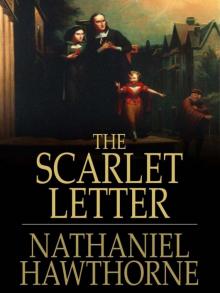 The Scarlet Letter
The Scarlet Letter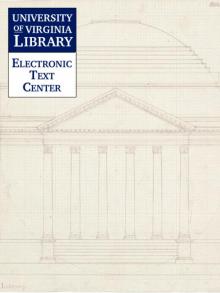 Young Goodman Brown : By Nathaniel Hawthorne - Illustrated
Young Goodman Brown : By Nathaniel Hawthorne - Illustrated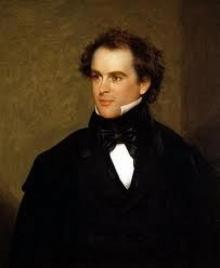 The Birthmark
The Birthmark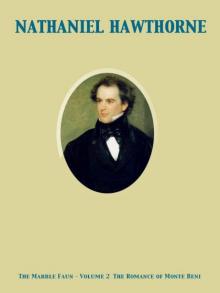 The Marble Faun; Or, The Romance of Monte Beni - Volume 1
The Marble Faun; Or, The Romance of Monte Beni - Volume 1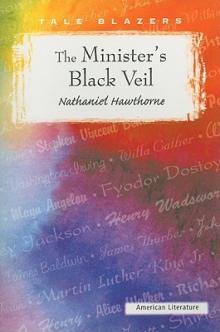 The Minister's Black Veil
The Minister's Black Veil The Great Stone Face, and Other Tales of the White Mountains
The Great Stone Face, and Other Tales of the White Mountains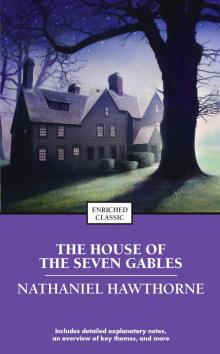 The House of the Seven Gables
The House of the Seven Gables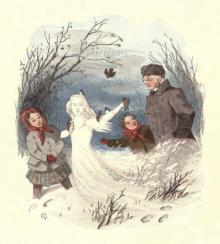 The Snow Image
The Snow Image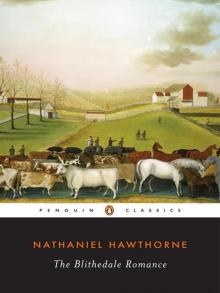 The Blithedale Romance
The Blithedale Romance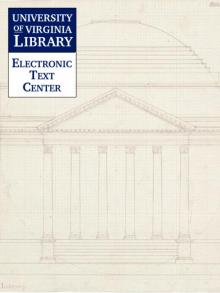 Rappaccini's Daughter: By Nathaniel Hawthorne - Illustrated
Rappaccini's Daughter: By Nathaniel Hawthorne - Illustrated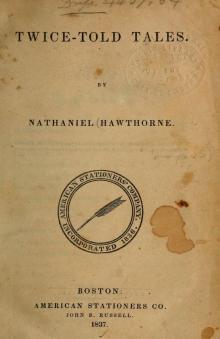 Twice-Told Tales
Twice-Told Tales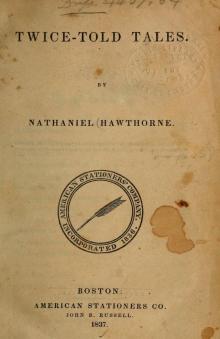 Twice Told Tales
Twice Told Tales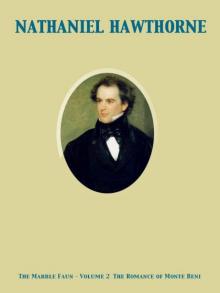 The Marble Faun; Or, The Romance of Monte Beni - Volume 2
The Marble Faun; Or, The Romance of Monte Beni - Volume 2_preview.jpg) Footprints on the Sea-Shore (From Twice Told Tales)
Footprints on the Sea-Shore (From Twice Told Tales)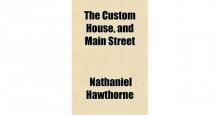 Main Street
Main Street_preview.jpg) The Seven Vagabonds (From Twice Told Tales)
The Seven Vagabonds (From Twice Told Tales) Fanshawe
Fanshawe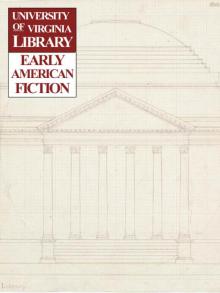 Chippings with a Chisel
Chippings with a Chisel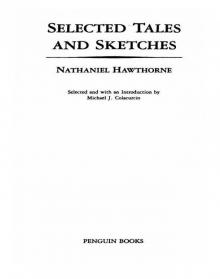 Selected Tales and Sketches
Selected Tales and Sketches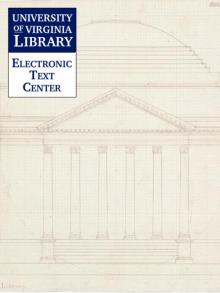 Young Goodman Brown
Young Goodman Brown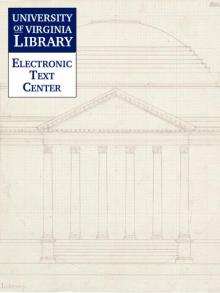 Roger Malvin's Burial
Roger Malvin's Burial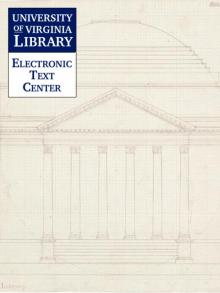 The Prophetic Pictures
The Prophetic Pictures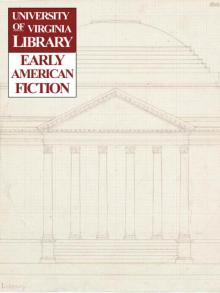 The Village Uncle
The Village Uncle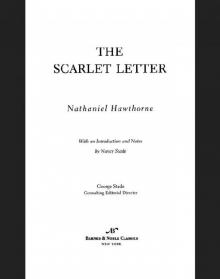 Scarlet Letter (Barnes & Noble Classics Series)
Scarlet Letter (Barnes & Noble Classics Series)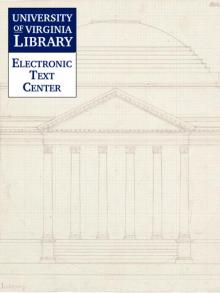 The Procession of Life
The Procession of Life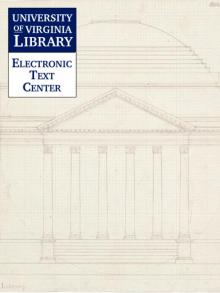 Drowne's Wooden Image
Drowne's Wooden Image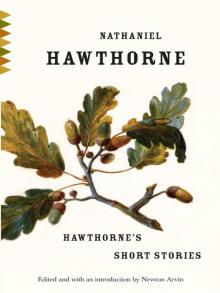 Hawthorne's Short Stories
Hawthorne's Short Stories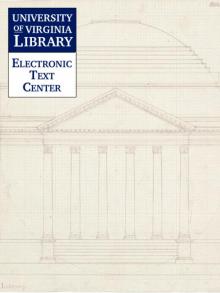 My Kinsman, Major Molineux
My Kinsman, Major Molineux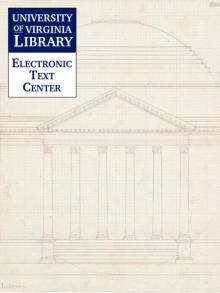 Legends of the Province House
Legends of the Province House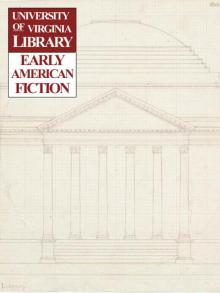 Foot-Prints on the Sea-Shore
Foot-Prints on the Sea-Shore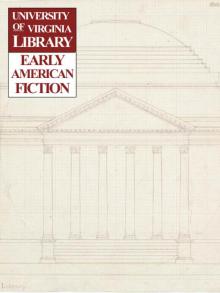 The Haunted Quack
The Haunted Quack Tanglewood Tales
Tanglewood Tales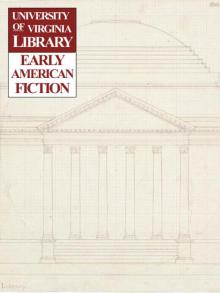 The Seven Vagabonds
The Seven Vagabonds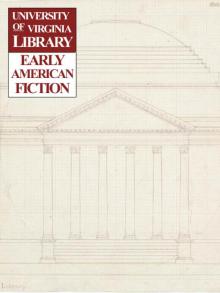 Mosses from an Old Manse, Volume 2
Mosses from an Old Manse, Volume 2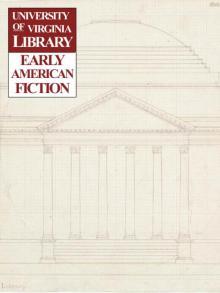 The Canterbury Pilgrims
The Canterbury Pilgrims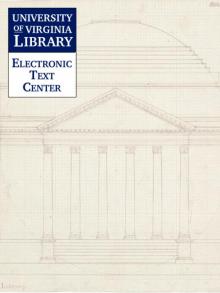 Wakefield
Wakefield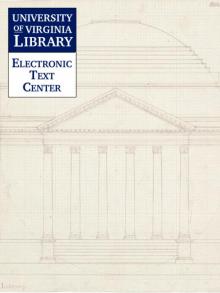 The Gray Champion
The Gray Champion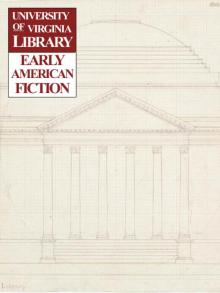 The White Old Maid
The White Old Maid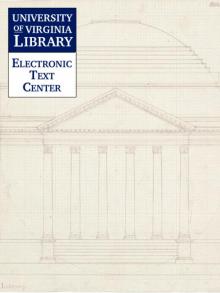 The Snow-Image: A Childish Miracle
The Snow-Image: A Childish Miracle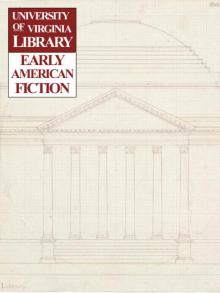 The Gentle Boy
The Gentle Boy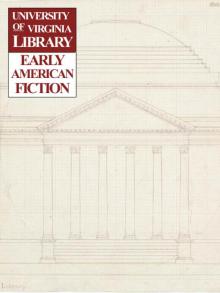 Mr. Higginbotham's Catastrophe
Mr. Higginbotham's Catastrophe![The Threefold Destiny: A Fairy Legend, by Ashley Allen Royce [pseud.] Read online](http://i1.bookreadfree.com/i2/04/10/the_threefold_destiny_a_fairy_legend_by_ashley_allen_royce_pseud__preview.jpg) The Threefold Destiny: A Fairy Legend, by Ashley Allen Royce [pseud.]
The Threefold Destiny: A Fairy Legend, by Ashley Allen Royce [pseud.]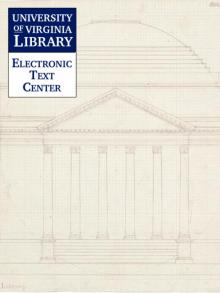 Lady Eleanore`s Mantle
Lady Eleanore`s Mantle The Great Carbuncle
The Great Carbuncle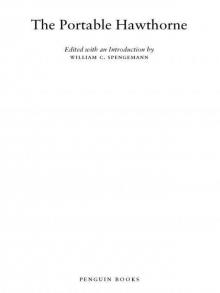 The Portable Hawthorne (Penguin Classics)
The Portable Hawthorne (Penguin Classics) True Stories from History and Biography
True Stories from History and Biography